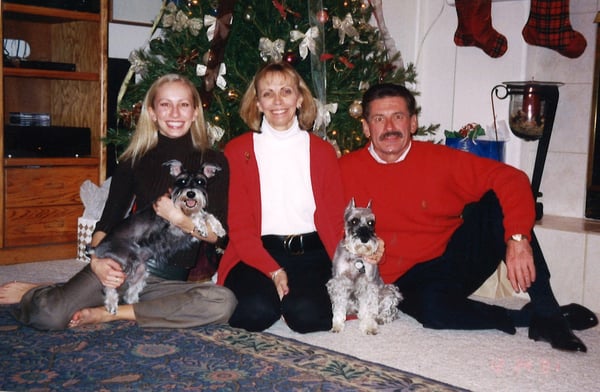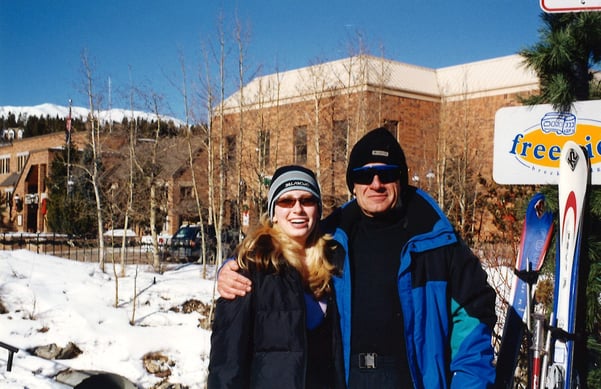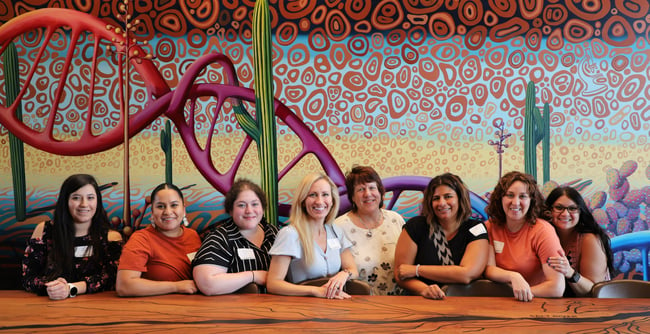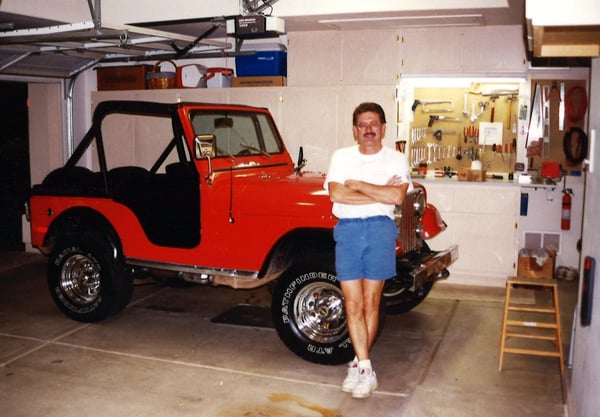By Alicia Shipman, LCSW, Clinical Manager
When I was 15 years old, I remember coming home to find my mom sitting on the couch looking distraught. Her friend held her hands in such a way that I knew something was wrong.
I learned that my father had just died by suicide. The shock, anguish, fear, longing, and struggle to accept the nature of his death was overwhelming. All I could do was run away to escape the news and hope the pain wouldn’t catch up with me.
I don’t believe my father wanted to die. He just didn’t want to feel the pain anymore. Yet, I often ask myself, “How could I have prevented this from happening?” I didn’t want to feel pain anymore either, but I soon learned that avoiding it would only make things worse. My mom helped me find a counselor so I could learn to deal with my father’s death in a healthy way.

In the midst of grief, I found strength and resilience — they were the guiding light that led me out of the dark. With each passing day I learned to not let my trauma define me. Instead, working with a counselor fueled my passion to help others through their trauma, too.
Now working as a Clinical Manager at evolvedMD, a company whose culture empowers employees to be vulnerable and share their truth, I am comfortable, ready, and able to share how I’ve made meaning out of trauma and hope it helps others make meaning of theirs, too.
My Journey at evolvedMD

As one of evolvedMD’s first employees, I provided therapy onsite at one of our partner’s primary care practices to help patients achieve the best possible outcomes.
In session, I could easily empathize with patients who had similar experiences to mine or who may have been experiencing suicidal ideations themselves. Learning to say how you feel is a lot like learning a new language, but teaching my patients how to put their feelings into words helped them manage traumatic experiences. It’s my way of instilling into them the same strength and resilience I’ve developed.
I knew I was a good therapist, but I felt I could maximize my impact as a supervisor training other clinicians.
Bringing Strength and Resilience to My Life’s Work

Surviving suicide loss motivates me to bring my fortitude to work each day, so I can positively impact others’ lives. Here’s how:
Asking Tough Questions to Save Lives
Stigma makes suicide difficult to discuss. However, it’s a common myth that talking about suicide increases the risk of someone acting on it.
It’s important to care for others — but care without action is not enough. Asking tough (and sometimes scary) questions is one of the most important actions you can take to show you care. Simply asking our at-risk patients, “Are you thinking about suicide?” or “Are you thinking about hurting yourself?” at their preferred primary care practice helps us coordinate much-needed treatment right away to prevent suicide.
We must ask others tough questions, too. Early on as a Clinical Manager, I noticed a primary care provider’s odd behavior. Knowing physicians struggle with their mental health, I wanted to show her the same care and compassion I have for patients. So one day I checked on her, and asked if she was OK. We had not spoken much before, but someone taking time to check in empowered her to open up and verbalize her feelings.
Listening with Your Whole Heart, without Judgment
Throughout my career I’ve noticed people won’t share feelings if they think we won’t understand or be supportive. I firmly believe that being nonjudgmental paves the way to open these must-have conversations, especially if someone is a survivor of suicide loss or thinking about dying by suicide.
Offering both a listening ear and an understanding heart are key to making others feel heard, validated, and accepted. Listening to others intently without judgment helps them take the first step toward not letting their experience define themselves.
I show concern through active listening and mindfulness. In practice, this means not just hearing what’s being said but truly digesting every word. True to evolvedMD’s culture, our leadership, clinical, and admin teams will reflect, validate, and repeat what is said rather than lecture or minimize problems.
Training Clinicians How to Address Traumatic Experiences
I read an article the other day stating the majority of mental health professionals have little to no formal training in effectively treating suicidal people. My father’s death drives me to work hard every day to become a better supervisor and clinician so my team feels set up for success. And we work closely to ensure they’re positioned to drive improved outcomes.
Whether their patients are survivors of suicide loss or thinking about suicide, evolvedMD’s collaborative approach and world-class training program ensures my team can effectively handle mental health crises.
I work with them one-on-one to elevate their skillsets. This includes active listening, asking tough questions, coordinating with patients’ primary care providers, contacting our in-house Care Coordination for external services, and hosting monthly Lunch-and-Learns at their clinics to teach about suicide awareness and prevention. These skills help our Behavioral Health Managers be more proactive and thoughtful in reducing stigma and normalizing care.
Making Meaning Out of Trauma

Suicide often has a ripple effect on friends, loved ones, and colleagues that can leave a long-lasting impact on their mental and emotional health. I never let my father’s suicide define me. I remember him as a great man who played a huge part of who I am today. My children also know their “Grandpa Hammer” as a great man who was hard-working, a biking enthusiast, and someone who loved his children dearly. They will never define him by how he died; he was so much more than that and I hope no one else lets their experience define their loved ones either.
If anything, making meaning out of my trauma helped me heal. It empowered me to create positive change for myself, my patients, the providers we work with, my colleagues at evolvedMD, our people-centric culture, and the behavioral health industry at large. Leaning into my past has helped me lead a career and a life my father would be proud of.
Our clinicians do amazing work every day to normalize care and help people through their trauma in healthy ways. Part of our company’s culture is being vulnerable with each other, and along the way I’ve witnessed how they lean into their traumas to drive positive change in their clinics.
My sincerest gratitude to evolvedMD for letting me share my story and how I’ve turned my trauma into strength. If you’re a clinician who wants work in a supportive environment — one that welcomes sharing lived experiences to help others face their darkest days — I encourage you to join me at evolvedMD.
About Alicia: Alicia’s career is rooted in her passion to reimagine behavioral health care and help people live their best lives. After earning her Master’s in Social Work from Arizona State University, she began her journey working in the non-profit sector doing grant writing and development for a small family homeless shelter. From there, she worked with a family preservation team at Arizona’s Children Association before transitioning into full-time medical social work. Today, she is making a demonstrable impact for providers as one of evolvedMD’s Clinical Managers as well as a therapist through her private practice, Lish Wellness. Outside of work, some of her passions include reducing the stigma associated with mental illness, engaging in activities with her family through their church, and spending time outdoors hiking Arizona’s many trails.